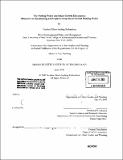The parking policy and smart growth disconnect : obstacles to establishing and implementing smart growth parking policy
Author(s)
Richardson, Heather Eileen Seyfang
DownloadFull printable version (13.60Mb)
Other Contributors
Massachusetts Institute of Technology. Dept. of Urban Studies and Planning.
Advisor
Frederick P. Salvucci.
Terms of use
Metadata
Show full item recordAbstract
Urban areas are plagued by congestion, economic inequality, and inefficient land use that result from highway and single family housing subsidies, segregated land uses, and many other government policies established over the last 80 years. Parking is one part of the complex and problematic system of traditional urban development that can benefit from a Smart Growth approach to urban livability. Parking is increasingly understood to be an underlying factor in traffic generation that leads to increasing vehicle miles traveled, congestion, and several other nuisances that arise from a growing number of vehicles on the road. Furthermore, parking increases the cost of living in urban areas where parking demand is high and supply is tight. Traditional growth patterns that encourage low density development with minimum free parking requirements exacerbate problems caused by parking. Smart Growth development counters traditional growth by offering mixed use development, maximum parking requirements, context sensitive design and focusing on increasing pedestrian and transit trips. After establishing the advantages of Smart Growth over traditional development for Boston, this thesis asks: why are the cities of Boston, Cambridge and Quincy not implementing Smart Growth when it could be better for everyone? Four case studies from the Boston Metropolitan Area (North Station, Ruggles, Quincy Center, and Alewife) will help identify the pros, cons, and constraints for shifting paradigms from traditional to Smart Growth policies. (cont.) This thesis argues that developers' perception of buyer demand, lenders' perception of buyer demand, and communities' preference for lower density are the main obstacles to Smart Growth parking policies in the greater Boston metropolitan area. Boston has many advantages in adopting Smart Growth: high density urban center, fairly well mixed land uses, reputation for being pedestrian friendly, as well as home to the sixth largest public transportation system in the country. The critical factors the city needs to change in order to implement Smart Growth include: disconnect between stakeholder perceptions of Smart Growth and the real estate market (stakeholders do not perceive themselves as 'winners' with Smart Growth), lack of affordable housing near transit, lack of enforcement for Smart Growth-oriented policies, increased transit capacity to handle future growth, and a more coordinated set of policies for housing, transportation, and economic growth that is centered around Smart Growth that a rigorously implemented and adhered to.
Description
Thesis (M.C.P.)--Massachusetts Institute of Technology, Dept. of Urban Studies and Planning, 2005. Includes bibliographical references (p. 95-100).
Date issued
2005Department
Massachusetts Institute of Technology. Department of Urban Studies and PlanningPublisher
Massachusetts Institute of Technology
Keywords
Urban Studies and Planning.